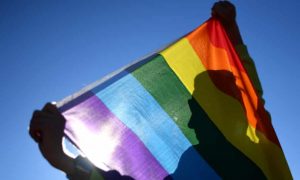Activists hopeful the majority of submissions will be in favour, amid previous signs of support and large social media campaign

More than 100,000 people have sent in submissions on New Zealand’s plan to ban LGBTQ conversion practices – more than have ever been made on a piece of legislation.
“We’ve already made history with this movement and we’re not even done,” said Shaneel Lal, an activist and organiser in the movement to ban conversion practices. “People really and truly care about this because in 2021 it is not appropriate to erase queer identities.”
The government received a total of 106,700 submissions on the bill, which will make it a crime to conduct conversion practices – or attempting to change someone’s sexuality or gender identity.
It is more than double the submissions received on other recent controversial legislation, including the End of Life euthanasia bill, which Stuff reportedwas the previous record-holder at 40,000 submissions. It was close to five times the number of submissions received on the bill legalising same-sex marriage in 2013.
The submissions have not yet been processed, so it is unknown how many were in favour of a ban – but Lal was optimistic that the majority would be, after a large-scale social media campaign asking people to submit their support. About 160,000 people had signed a petition to ban the practice earlier in the year, and polling by TVNZ in September 2020 found 72% of New Zealanders favoured a ban, and just 14% opposed. Lal said the campaign’s template for a submission to ban conversion practices had been opened more than 300,000 times.
For New Zealand’s rainbow community, Lal said the news had been greeted with a mixture of celebration and trepidation – pleasure at seeing such a groundswell of engagement was tempered by concerns that it could lead to vitriol as the debate became increasingly prominent in the public eye.
“The select committee process is the more loud and traumatic part of the entire process. This is when people start very aggressively advocating for their side,” Lal said.
For survivors of conversion practices, “it’s like an emotional tsunami”, Lal said. “People are feeling very anxious and nervous, and for me it is important to ensure that our community is safe within the process – while I was excited to see the number of submissions, I was also nervous and anxious, what this may mean for our community.”
Justice select committee chair Ginny Andersen told TVNZ it would take about two weeks for 41 staff to process the submissions. She said the committee would also hear about 3,000 oral submissions.
Simon Bridges, the opposition National party’s justice spokesperson, said “the likelihood is that a majority of these are critical” of the bill, and called for more time for the bill to be considered.
“Due to the Covid-19 lockdown and the unprecedented numbers who want to be heard, the submission process should be extended to take until at least the end of the year,” Bridges said.
The legislation would make it an offence to perform conversion practices on anyone under 18, or with impaired decision-making capacity, with a sentence of up to three years’ imprisonment. It also makes it an offence to perform conversion practices that cause “serious harm”, irrespective of age. That carries a sentence of up to five years’ imprisonment.
Conversion therapy is still legal is many parts of the world, including the UKand many states in the US.
The United Nations independent expert on protection against violence and discrimination based on sexual orientation and gender identity found conversion practices caused “significant loss of self-esteem, anxiety, depressive syndrome, social isolation, intimacy difficulty, self-hatred, shame and guilt, sexual dysfunction, suicidal ideation and suicide attempts and symptoms of post-traumatic stress disorder.”
The National party voted against the bill at its first reading, and said they would not support the legislation unless it included an exemption to stop parents being prosecuted. With strong support from the Labour and Green parties, a second reading would have the numbers to pass without them.
